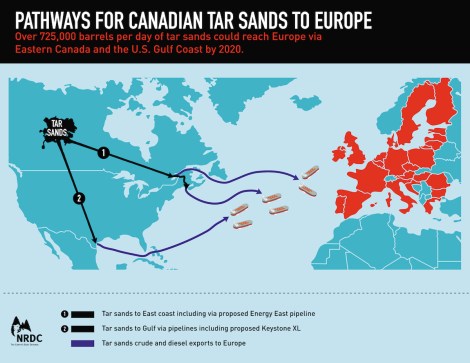Hey, European drivers, how would you like your gasoline to be even more filthy and climate-changing than it already is?
When the European Commission proposed new climate and energy rules for the European Union this week, it recommended opening a door for companies that want to import Canadian tar-sands oil into the continent. Responding to Climate Change explains:
Oil from Canada’s carbon-intensive tar sands — one of the world’s single biggest sources of greenhouse gas pollution — could be used in the petrol tanks of European motorists from 2020 after the European Commission proposed to scrap curbs on imports of highly emissions-intensive fuels. …
“[The EC proposal] is good news for oil companies and Alberta, with its high-carbon tar sands, but bad news for Europe in our move towards a more sustainable transport system,” said Nusa Urbancic, a campaigner with Transport and Environment.
The Natural Resources Defense Council warns that without the E.U. restriction on dirty fuels imports, “global oil market trends suggest that Canadian tar sands exports to Europe will grow from a trickle to a flood.” From a new NRDC report:
Canadian tar sands crude currently only makes up 0.03% of European fuel stocks from an estimated 4,000 [barrels per day] of diesel imported from the U.S. Gulf Coast. However, changes in global energy dynamics left unchecked could lead to a significant rise in the use of tar sands derived fuel, increasing to upwards of 725,000 barrels per day (bpd) by 2020 and 640,000 bpd by 2030 according to estimates by NRDC.
This could make European Union goals to reduce greenhouse gas intensity in the transport sector more difficult.
This NRDC diagram illustrates how the Keystone XL pipeline would help tar-sands miners and refiners ship their product to Europe:





